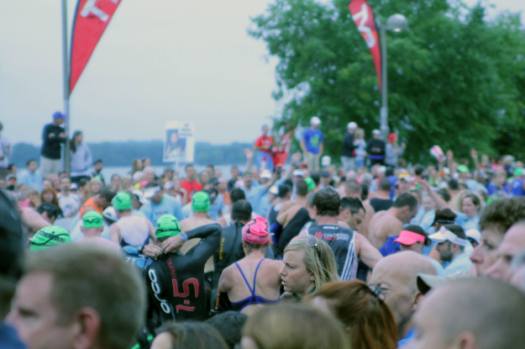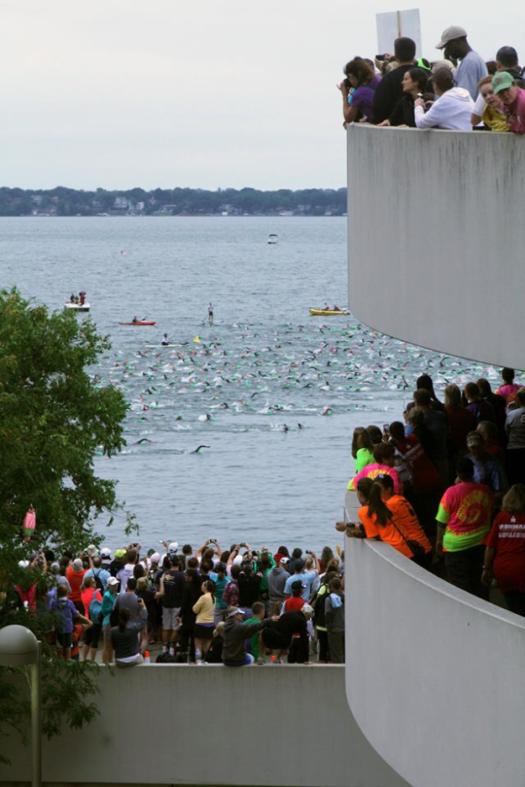Recently, ESPN “Outside the Lines” spearheaded this piece on the dangers of open water swim in triathlon. It is a gloomy account that’s steeped in murky water — and I’ll likely be reminded about it for years to come by friends who prefer the safety of a couch.
Of course I feel bad for anyone who has lost a loved one to inopportune death. Two close friends of mine have died (outside of triathlon) when I least expected it, but no amount of advice or controls would have changed those endings. People go their own way, and people pursue Ironman because they have a desire to push themselves to the limit. They understand what they’re signed up for — and making them wear seat belts doesn’t mean they won’t be texting and driving.  I could be the poster child for anxiety in the water, but the “danger” of open water swims is half (or more) of the reason I am so drawn to them. I have done every kind of swim start and have turned into a basket case in multiple races. I’ve clutched kayaks, buoys, and pool edges trying catch my breath, calm down and get a grip on reality. I understand how it feels to be in a major state of panic which can trigger something we are now referring to as “worrisome” situations.
I could be the poster child for anxiety in the water, but the “danger” of open water swims is half (or more) of the reason I am so drawn to them. I have done every kind of swim start and have turned into a basket case in multiple races. I’ve clutched kayaks, buoys, and pool edges trying catch my breath, calm down and get a grip on reality. I understand how it feels to be in a major state of panic which can trigger something we are now referring to as “worrisome” situations.
 World Triathlon Corporation has responded to increasing criticism with “rolling swim starts” as part of their Swim Smart initiative.* Swim Smart is a solid and progressive idea, but rolling starts are are not a panacea.
World Triathlon Corporation has responded to increasing criticism with “rolling swim starts” as part of their Swim Smart initiative.* Swim Smart is a solid and progressive idea, but rolling starts are are not a panacea.
The ESPN article says, “There are no simple answers,” yet, I think this line, buried deep in the piece, is the key to everything:
“There is a growing consensus that a warm-up or pre-race water acclimation area can help relieve athlete anxiety, but races are not required to provide one.”
Most outsiders would probably look at rolling starts and say, “Oh, yes, that is much safer because of fewer people and less body contact,” but as a relative beginner and someone who has been there, I don’t believe those are the main issues.
I consider myself a “decent” swimmer and felt comfortable enough to start in the front row of a 2.4 mile swim with 2,800 people, but just six weeks later I nearly freaked out 500 yards into a wave start with 60 swimmers at the Goosepond 1/2 triathlon. Why?
Top tier athletes are experienced and in good enough shape to “get by” without a good warm up, or acclimation to the water, but marginal swimmers or older age groupers (like me) are not as equipped physically or mentally. And I’ve learned, that it’s not the anxiety of body contact as much as the rush of the race that throws me off. When the cannon fires, people lose their minds and for some reason think they can sprint an entire Ironman. At the very least, most forget their plan and go out way faster than they should.
It’s not like rolling starts prevent contact. You’re still talking several hundred people starting at once and there will be flogging. Two athletes I trained with this summer just did the rolling start at Ironman Florida and one got a fat lip . . . the other a black eye.
If you want to talk about tough ways to start a race, look at Ironman Louisville (which I will be doing next year). 3,000 racers stand around in the dark, then shuffle down a pier and jump into the water with tight feet. As far as I know they don’t even let you warm up in the water (unless you’re a pro) at Louisville — and I think going in cold is by far the biggest concern.
Getting into the water 20 minutes early at Ironman Wisconsin saved my swim. I was in tune with my surroundings, acclimated to the water, and treading that long was a good warm up. It was an mass start and by far my longest open water swim, but I had no abnormal anxiety.
If we want safer races, which we do, triathlons and coaches should put more energy into educating people about the importance of a warm up, or be clear that they start comfortably at their own pace. Rolling starts may spread out the humanity, but they do nothing to slow a person down, in fact, they may speed them up in the worst way possible.
Ultimately, this comes back to the athlete. Nobody knows your body better than you and ignorance of the law is no excuse. I have “failed” in multiple swims, but I cannot blame that on the race or race director. It was me that didn’t warm up. It was me that didn’t put enough time in the pool or open water. It was me that didn’t listen to the coach or doctor. It was me who didn’t meditate, hydrate, or get enough rest.
I got into that mass swim start at Wisconsin fully aware of the risk, and that’s what I loved about it. I am here to live, not sit around and hope life shows up in a child proof package. But it seems we are on an impossible mission to take all risk out life, and our obsessions usually tend to make things more dangerous.
Deaths in triathlon are a sad, but inevitable fact that has more to do with individual preparation and precaution than simply changing the rules of the race. I realize the short term focus is aimed at pleasing lawyers, but triathletes I know prefer to deal with the real problems rather than mask the symptoms.
——————————-
* IRONMAN defines a rolling swim start as: Athletes will enter the water in a continuous stream through a controlled access point, similar to how running road races are started. An athlete’s times will start when they cross timing mats under the swim arch.
The women’s tri that I have done three times did a rolling start this year and that freaks me out more–and it’s harder for the top swimmers because instead of having a clear field for a few minutes before catching up (and swimming through) the previous group, they NEVER have an open field to swim–they’re always getting kicked. How is that better?
Just curious.
I start off every tri by bobbing as I wait for the horn. Now I won’t really be able to do that. That freaks me out a little 🙂
I was in that “rolling start” in Florida and it was a joke. Self seed never works, in any sport because most people can’t/won’t accurately seed themselves properly. I too ended up with a bruised eye socket and also a lung full of salt water by some guy who was freaking out and tried to use me as a surf board….
It would’ve been better to have a mass start and just let us start where we felt comfortable….this ended up being dangerous.
VERY WELL SAID!! I think it is all in how people prepare (or don’t prepare) themselves for whatever race they’ve entered.
Thanks! I think it’s kinda like that for most things in life, actually.
I couldn’t agree more!!